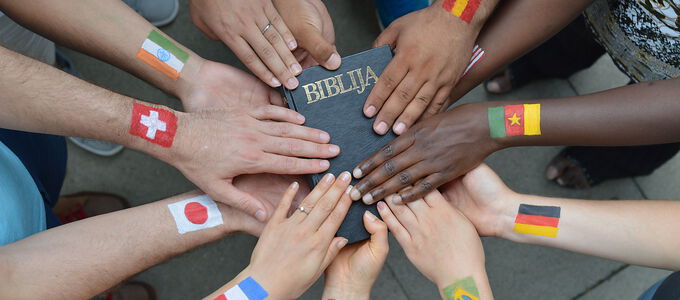
One faith, one doctrine – one church, many cultures: this was the common idea that hovered over almost every item on the agenda at the recent District Apostles’ Meeting in Zurich, Switzerland.
This began already with the spiritual part, with which Chief Apostle Jean-Luc Schneider kicked off the two-day meeting last Thursday. He outlined the underlying conditions for the international Global Church: diversity, globalisation, migration—“both a blessing and a challenge at the same time”, was his diagnosis.
And this did not stop at the lunch table, where the District Apostles and their assistants continued to discuss the challenges in their home countries. Europe, for example, has to deal with increasing fatigue towards Christianity. In India, there is often no basis for dialogue because only a minority is Christian. In Africa, the large number of languages poses a challenge for the teaching of a standardised doctrine.
Unity at the altar
“The New Apostolic faith can be practised within the most diverse of cultures,” the Chief Apostle said in his interview in 2018 on the Church’s strategy. What this means in organisational terms in practice was demonstrated once again at this meeting. Because the District Apostles continue to work on giving sufficient space to the differences while preserving the unity of the Church and the integrity of its doctrine.
This can be seen, for example, in the progress report on the work of the various specialist groups that do the groundwork for the District Apostle Meeting. The forthcoming liturgical book by the Working Group Divine Service Guide, whose (slightly updated) directions connect the whole world, is part of this. But the Divine Service Guide itself, which forms the basis for divine services, take regional differences into account: it exists in the form of a monthly publication or as a yearbook, depending on the infrastructure available for distribution in the respective countries.
Space for diversity
The topic of brand protection focused on the unity of the Church’s appearance. The New Apostolic Church International (NACI), whose head office is based in Zurich, is responsible for protecting the Church emblem and the Church name from misuse by third parties. This requires different measures in different countries. However, there is also room for regional culture within the legal framework. For example, the Working Group Communication Europe is fine-tuning a new design manual.
Sometimes, however, it is useful to smooth out existing differences, such as in the ongoing training of ordained ministers. Not every Regional Church has an established training system. This is what emerged from a survey that was conducted in the run-up to the previous District Apostles’ Meeting. NACI is now developing an online learning tool for these regions, and a sample module was presented.
What counts is the message
Cultural differences were also the subject of a remark that Chief Apostle Schneider made at the beginning of the divine service for the ministers of Europe. “We live in a world where so much emphasis is placed on words,” he observed. He cited the example of gender-neutral language, which is a major issue in German society in particular.
“We should never forget that the message of the sermon is always more important than the vocabulary,” the Church leader said, and not just when it comes to gender. This also applies to the preacher, who may not be very eloquent. And when it comes to expressing our appreciation for our neighbour “let us place more importance on action than on words”.
The message of the entire divine service more or less corresponded to the conclusion of the spiritual part of the District Apostles’ Meeting: “Let us tirelessly proclaim the gospel of Jesus Christ.”
Photo: what4ever – stock.adobe.com




